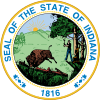Recount Dispute
One day after the Secretary of State certified Hartke as the winner, Roudebush filed a petition for a recount in state court. The state court appointed a three-person commission to oversee the recount. In response, Hartke sought an injunction against a recount, arguing that under Article I Section 5 of the Constitution, the Senate has the sole power to judge its own members. The district court granted the injunction. Roudebush appealed the district court's decision, and the case was granted cert by the U.S. Supreme Court. While the case was before the Supreme Court, Hartke was administered the oath of office and seated. [3]
The Supreme Court, in Roudebush v. Hartke, ruled that a state had the broad powers to regulate election including recounts. Such a recount would not restrict the Senate from making its own determinations as to who to seat, with the Senate being allowed to conduct its own recount if it so chose. Even after the Senate had seated Hartke, a state recount would not violate Article I Section 5. Therefore, Indiana could conduct a recount. [4]
The much awaited recount would show that Hartke was indeed the winner. On July 24, 1972, almost two years after the election, Hartke was seated without reservation in the United States Senate.



